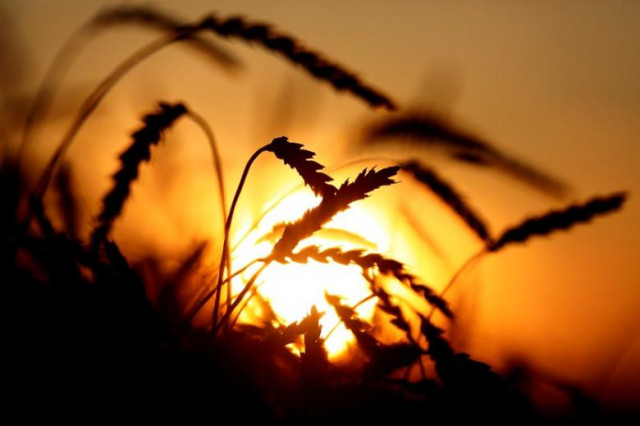Country likely to import 4.62m MT of wheat to meet shortfall
PM Shehbaz laments country compelled to import wheat due to ‘wrong decisions’

Prime Minister Shehbaz Sharif was informed on Friday that the country, which should have been self-sufficient in wheat, would have to import the commodity to meet production shortfall of 4.62 million metric tonnes.
A high-level meeting, chaired by Premier Shehbaz, held to examine wheat production, available stock and expected production was apprised that output of 26.173 million metric tonnes was expected this year against the target of 28.89 million metric tonnes while the estimated consumption would be around 30.79 million metric tonnes.
The meeting was told that “reduced wheat cultivation, water shortage, and fertiliser crisis due to the mismanagement by the previous government and delayed announcement of wheat support price” caused a two per cent decline in wheat production.
PM Shehbaz lamented that despite being an agricultural country, Pakistan had been compelled to import wheat instead of meeting its own needs through local production “due to the wrong decisions and delayed strategies”.
He directed the authorities concerned to prepare an urgent strategy to curb “corruption and theft of wheat” and for the construction of silos for storing the commodity, saying it would deter the problem.
“The construction of silos will help curb theft and corruption,” Shehbaz told the participants of the meeting.
The oil price hike and early increase in temperature due to climate change were also among the factors impeding the achievement of the wheat production target.
The prime minister was also apprised of relief measures taken by the incumbent government including subsidy on wheat supply to flour mills, availability of 10kg flour bag at Rs400 and provision of 200,000 metric tonnes of wheat to Khyber-Pakhtunkhwa (K-P).
The prime minister directed the authorities concerned to assess the wheat consumption of K-P and ensure the provision of the required supply of the commodity in coordination with the provincial government.
Read PM directs Punjab govt to provide 0.2m MT wheat to K-P
The meeting was told that Punjab had achieved 91.66 per cent of the wheat procurement target, Sindh 49.68%, Balochistan 15.29% while Pakistan Agricultural Storage and Services Corporation (Passco) had achieved 100%.
The prime minister said that the delayed announcement of wheat support price had not only led to reduced wheat production but it was also an attempt to directly oblige the hoarders.
He also asked the Punjab province to enhance its procurement target and directed the Food Security Division to import the wheat in order to bridge the shortfall.
The prime minister also expressed his resolve to make Pakistan self-sufficient in wheat through an effective strategy.
Minister for Food Security Tariq Basheer Cheema, senior officers of Passco and Punjab Chief Secretary and provincial government officers attended the meeting.
Further, PM Shehbaz held a meeting with Minister for Finance Miftah Ismail and discussed measures for providing relief to the people.
The prime minister expressed satisfaction over the current price of sugar, saying that the price of sugar came down after three years which provided relief to the people.
He issued direction to provide cash credit to Passco for buying of wheat. The finance secretary was also present in the meeting.
Separately, Shehbaz also held a meeting with Raja Zafarul Haq and discussed the overall political situation in the country.
In the meeting, Haq congratulated the PM on his successful visit to Saudi Arabia and the United Arab Emirates.
He also appreciated the premier for his vision to complete public welfare projects on a priority basis.
The PM also met with National Assembly member Qaiser Ahmed Sheikh and discussed the present political situation in the country.
(With input from APP)



















COMMENTS
Comments are moderated and generally will be posted if they are on-topic and not abusive.
For more information, please see our Comments FAQ